Humvees roll through the Kuwaiti desert, with American marines manning 50. cal. machine guns and 40mm. grenade launchers on top. A dust storm has been stirred by the Marines’ motorized advance, and our camera cuts to the Marines’ stern faces as they drive towards their supposed enemies.
The loud hum of the vehicles and scraping of tires against dust and sand is interrupted by belches of machine gun and grenade fire. Crashes of steel eviscerate the dirt hundreds of yards away. An Apache attack helicopter swoops low and delivers a rocket volley, turning mounds of sand into glass. The Humvees pick up speed.
But right as the action has intensified, the guns go silent and the Marines stop their vehicles. They slowly get out and look at the scene in front of them – no enemies, only scorched earth. They begin to laugh, and congratulate each other on a training mission well done. An officer gives instructions on how to improve, and the Marines mount up and drive away. “When do we get to see some real action?” a few of them complain as they leave.
Welcome to the third of HBO’s War Epics, Generation Kill.
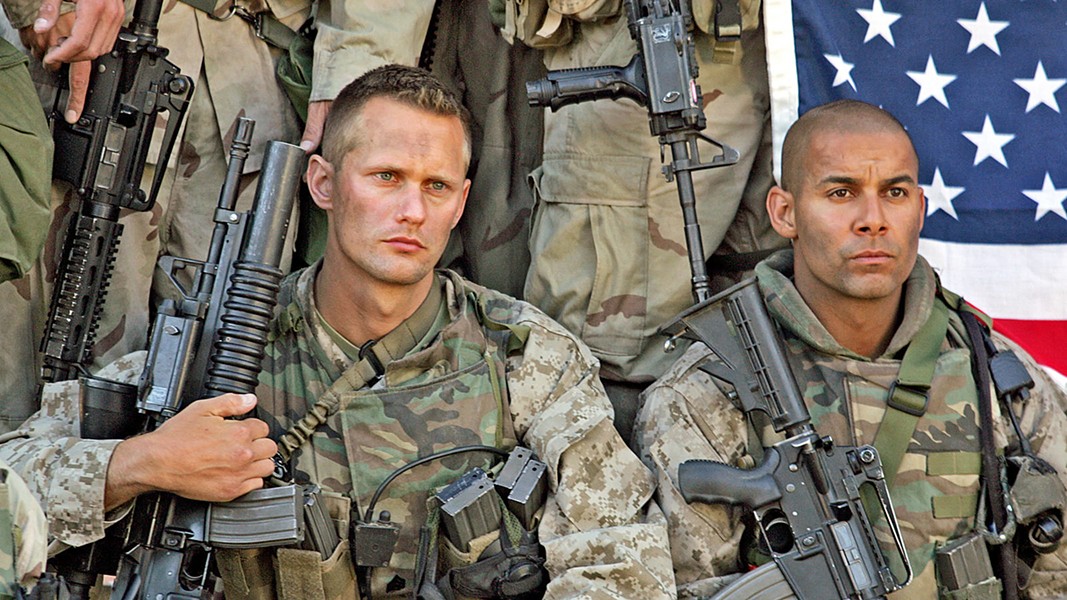
Prologue
I’ve covered the more conventional series Band of Brothers and The Pacific, directed by the visionaries Stephen Spielberg and Tom Hanks in two previous articles, but I always knew I had to save Generation Kill for last. Generation Kill always was the most unorthodox of the three, not only because of its setting of 2003 Iraq, but also its unique mode of storytelling and character writing.
If Band of Brothers had gut-wrenching yet triumphant battle scenes and character arcs, and The Pacific delivered much needed insight onto the emotionally traumatic effects of war, then Generation Kill shows us the unseen methods and means on how the military is run.
The series, based off of a book of the same name from the writer Evan Wright, covers the 1st Marine Reconnaissance Battalion, which was designated by the US military as the lead element during the invasion of Iraq. The first 21 days of the invasion are depicted on film by seven episodes.

The Plot
I’ll briefly explain the plot before I go into the significance of this groundbreaking show. Generation Kill follows a Rolling Stones reporter – Evan Wright – as he immerses himself in a Marine Reconnaissance Battalion as it prepares to invade Iraq.
Wright finds himself in the backseat of the lead vehicle of the Marine shock column, with Sgt. Brad Colbert – nicknamed the “Ice Man” for his coolness under fire driving. Corporal Ray Pearson sits shotgun as the Humvee’s radio operator with Lance Corporal Trombley – a rookie to the unit – and Corporal Walt as the 40mm. gunner up top.
Leading the lead platoon is 1st Lieutenant Nate Fick, a Dartmouth graduate who remains one of the only competent officers depicted throughout the show. Fick maintains a close relationship with his NCO’s (Non-Commissioned Officer) such as Colbert, as contrasted to other officers such as “Captain America” and “Encino Man” who possess neither their men’s trust nor Fick’s astute leadership.
Lt. Colonel Stephen Ferrando, nicknamed “Godfather” given his raspy voice, commands the battalion.
What Makes It So Different
Generation Kill covers many things, much like The Pacific, from the enlisted personnel’s perspective. But it eschews the other two show’s focus on overarching themes: brotherhood, valor, longing to return to family – in favor of “[trying] to record the experience of war in as many concrete aspects, and as close to the eyes of soldiers, as possible,” as said by reviewer and French Army officer Jean Michelin.
The best way I can describe Generation Kill‘s storytelling is that the show resembles a documentary about a road trip through different combat zones. There’s 89% talking, waiting, and banter, 10% briefings and 1% combat. The dialogue is by far what makes the show so great. Michelin writes that “the marines depicted in the show are utterly believable. Their constant banter, profanity, and gung-ho attitude in the way they address one another immediately struck a chord with my own experience as a foreign officer embedded in the US military.”
The Marines in the show are not picture perfect or have clean mouths by any means, because that’s not how military personnel – especially infantry – are in real life. While Band of Brothers and The Pacific show so much combat that most dialogue serves to project the story or give character development that was deliberately edited to give, at most, there’s only light hearted banter and PG-13 jokes.
The same cannot be said for Generation Kill.
The Marines depicted are “intelligent and dimwitted, panicked and headstrong, sensitive and insensitive, homicidal and reflective, homophobic and homoerotic, and more.”
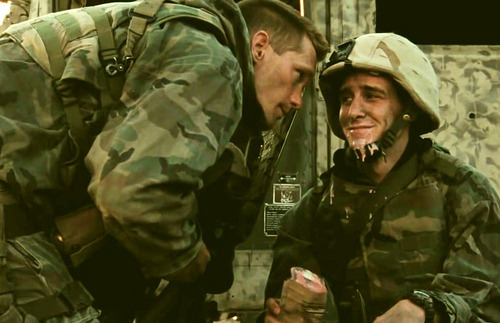
Why? Because that’s how most Marines – and a lot of young men – act when they are around close friends, especially in such a stressful environment. Don’t just take this 18 year old’s high schooler’s word for it though, just listen to these reviews:
Peter Maass, who was embedded in Marine recon battalions during their drive to Baghdad, had this to say: “down to the Marines’ hatred of Skittles… the program is faithful to the smallest detail of the invasion I had witnessed.” Several Marines who actually served in the invasion played roles throughout the cast. Countless other Marine and Army personnel have applauded the show’s bold depiction of the Marines in all their character.
Sgt. Brad Colbert – still an enlisted Marine during the show’s premier – was pulled into his superior’s offices, including General Jim “Mad Dog” Mattis, to see if the show’s witty dialogue was accurate. He defended it and said the following: “I don’t tell my Marines in the heat of battle what to say and what to think. What I ask my Marines to do is execute commander’s intent. And I like to think my Marines did what was asked of them and more.”
Cpl. Ray Pearson, who watched the premier with his wife in 2007, had this to say about the show:
“For her to be able to see it on the screen and have it so accurately portrayed just visually, I loved that. ‘See that, that’s exactly what it was like.’ That was what I enjoyed the most out of the entire thing.”
If you’re sensitive to these kinds of jokes or use of non-politically correct language, don’t watch this show. Many people were understandably shocked at the idea of America’s premier fighting force being as immature as a bunch of high school boys but the show quite frankly couldn’t care less. It wanted to accurately portray the Recon Marine’s drive to Baghdad, and it couldn’t have done a better job.
There’s a reason why many veterans of Iraq – and beyond – enjoy this series so much. While I watched the show at my house, my Grandfather, who served in the US Army Reserves in the 1960s and 70s, defended the show’s uncensored language to my Grandmother by simply saying: “Honey, that’s how Marines talk.” It’s startling how relatable this show is to so many veterans.
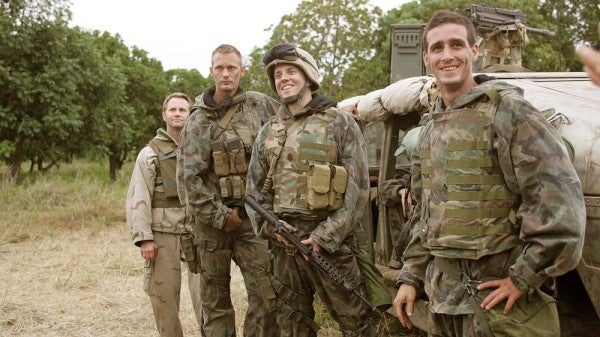
Illustrating Perspectives
The best accomplishment of Generation Kill is the varying perspectives of the war shown. Whether from the enlisted, officer, or even Wright’s perspective, the show illustrates the moral and administrative complexity present throughout the 2003 invasion, although certainty not unique to it.
The show displays the “fog of war” especially well. Throughout the series, the battalion is split between two reconnaissance companies – Alpha and Bravo, call signed “Assassin” and “Hitman” respectively. The two companies are frequently split, and to one company or the other, the enlisted and even low-level officers (like Fick) have no idea to the cause of such actions; only Ferrando and the officers receiving said orders understand.
Requests by enlisted Marines to conduct operations – like requests to fire – are shown to take precious time to go up the chain of command. The maxim “help is minutes away when seconds count” is proven throughout the series. Uneducated and ignorant officers – especially higher ups – are shown to give nonsensical or contradictory orders that cost the Marines valuable time, resources, and lives.

In one memorable scene, Iraqi militia armed with heavy weaponry approach the Marines, who request to fire but are told only uniformed Iraqi troops are targets for fire. The Marines allow the militia to escape, and hours later the Marines find Iraqi deserters who tell them that the same militia they allowed to escape slaughtered innocent civilians they believed to be American spies.
In fact, the Reconnaissance Battalion – who were trained to be elite scouts for the Corps, trained in airborne and seaborne infiltration – were used as shock troops sums up the decision-making made throughout the show. “You know what happens when you leave the Marines?” quips Pearson, “you get your brains back.”
Lt. Fick, being one of the few competent officers displayed, frequently clashes with his superior – Cpt. Craig Schwetje, also derided by his Marines as “Encino Man” for his incompetence. When Schwetje attempts to call in an artillery strike that would have landed right on top of the Marine company, Fick forcibly prevents him from doing so, drawing the former’s ire at this challenge of his leadership. When Lt. Fick chews out Schwetje again for sending Marines out on a suicidal and pointless reconnaissance mission, the straw broke the camels back. Rumors abound that Fick will be court-marshalled, although nothing materializes.
But while the enlisted Marines have the opportunity to give Wright a negative view of most officers, the end scene where Wright is able to interview Lt. Col. Ferrando gives unique perspective on dealing with his subordinates.
“We have seen such incompetence, actions by officers that put Marines and civilians lives in danger, that we – and Wright – seem ready to lay it all out to Godfather.” Wright asks Ferrando about “Captain America,” and Ferrando admits that while the conduct of many officers in his battalion was less than exemplary, he, as an officer, receives “conflicting reports… we are in a war zone, if I can expect my subordinates to execute necessary tasks they must have my trust, and that trust is not lost until their incompetence is proven beyond a reasonable doubt.
The same support I extend to Captain America I extend to all officers. Lt. Fick, for example, has some saying he is unfit for command. What happens to my command if I respond to every complaint made against one of my men? It’s a terrible feeling to be the man to sending other people to combat. A terrible feeling. But something else I’m struggling with is the excitement I felt, getting shot at. It’s just something I hadn’t anticipated about war. Did you?”

The Violence
Lastly, Generation Kill covers the emotional effects of the Iraqi campaign upon the Marines. I did say that this series was 89% witty dialogue, 10% briefings, and 1% combat. The 1% only occurs in a few episodes – an urban ambush here, stray artillery rounds a few hundred yards away there, and is never constant like in Band of Brothers or The Pacific.
But said combat, while being extremely brief, leaves a visible impact upon its audience. For one, most of it is up-front and personal, with urban combat and insurgents driving suicide cars towards the American convoy. The Marines often see the faces of the men they have just killed, and the combination of sleep deprivation, emotional stress from leadership struggles and constant driving takes its toll.
Throughout the series, a Marine records the campaign through a hand-held camcorder, and most of them possess a nonchalant attitude towards what they witness. Over time however, the dead civilians, destroyed schoolhouses and command failures take their toll.
The Marines nevertheless endured, and their elite status as Reconnaissance Marines meant they suffered only one wounded casualty throughout the entire campaign – despite inflicting horrific casualties towards their foes and leaving a path of destruction in their wake.
The show ends after the battalion enters Baghdad. Although the show ends there, the 1st Marine Reconnaissance Battalion would go on to fight in Fallujah and still exists to this day as the Marine Corps’ premier fighting force.
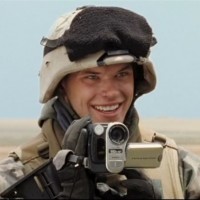
Conclusion
HBO’s Generation Kill truly stands out as the black sheep of the previous war epics I’ve covered. From Band of Brothers to The Pacific, heroic sagas of American servicemen’s experience during WW2, Generation Kill represents the modern American serviceman’s experience in the sands of Iraq and Afghanistan. Although all American veterans have a unique claim to valor, their experiences are extremely different across the various eras, units and roles they’ve filled.
I think that Generation Kill completes the logical movement of HBO’s military sagas – from Band of Brother‘s more character driven story to The Pacific‘s preference for the emotional trials of its main characters, and now to a show where combat is sparse, but storytelling still aplenty.
To this day, most Marines of Generation Kill are still around. When I watch this series, I remind myself that the events of the show were only 20 years ago. It’s sometimes hard to relate to the aged heroes of the past, the paratroopers of Easy Company and Chesty Puller’s Marines, but Generation Kill teaches us that valor – in all its imperfection – has been passed down to the present, and it can still be found amongst us.

Stay tuned to The Roundup for more TV show and movie reviews!
